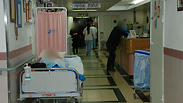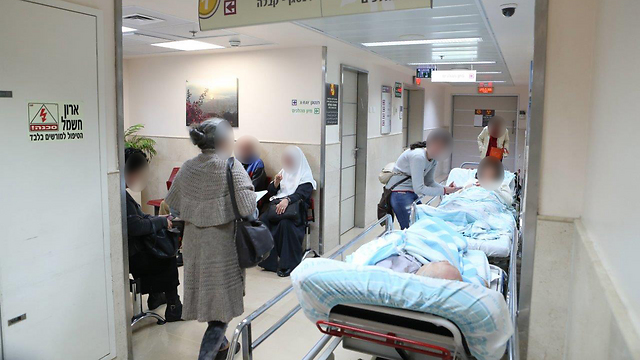
The district labor court, however, accepted a petition by the Hadassah Medical Center, ordering its doctors to return to regular operations by 10am.
In her decision to order the Hadassah doctors back to work, Judge Sarha Broiner Yashrzada stated that opposite of the right of doctors to strike "stands the clear plight of the sick, who have been waiting months for medical procedures that were scheduled for them today. The medical harm caused by delaying treatment, even if not an immediate threat to life, surely damages the health of the patients. There is no room for denying medical personnel their right to strike, but when we are dealing with this type of service, the court deems it important to bear in mind the plight of those affected."

The hospitals will work according to Shabbat protocols, wherein all nonessential treatments and surgeries will be postponed. The strike is expected to increase the workload in hospitals and thus extend already prolonged waiting periods. Patients who do not require urgent care are advised to postpone their visit, or alternatively go to an HMO clinic instead.
The strike, which started at 8am Thursday, will last until 8am Friday. Hospitals will then return to normal operations during the weekend and on Sunday, which is the fast of Tisha B'Av. A decision will then be made whether to resume the strike on Monday.
The sides will meet again at the beginning of next week to resume negotiations. The Israel Medical Association has said they were striking over the state of public medicine in Israel. The doctors are demanding a significant increase to their budget for the implementation of a program that would shorten waiting periods at public hospitals; additional interns to allow the doctors to rest during their shifts; and the scrapping of plans to discipline hospital administrators who exceed their set budget.
The deputy head of the IMA, Dr. Nimrod Rahamimov, explained that "the problem lies in the chronic under-funding of the health system. This isn't a battle for our pockets, but rather for the quality of public health."
Dr. Alex Levin added: "The Economic Arrangements Law hurts not just hospitals, but also community services. The health system is lacking doctors, especially in the periphery. Community medical services aren't striking today, but will join in the next steps."
Health Minister Yaakov Litzman said the strike was "redundant, without a real purpose. It will not benefit the public or the health system. The Ministry of Health has extensive contacts with the Ministry of Finance in order to strengthen public health by adding more beds, manpower, and additional resources (to hospitals). This is in addition to many other steps we have taken for the good of the sick, the doctors, and the public health system. The main concern of the doctors—restrictions on department heads from private practice—does not exist following its removal from the draft of the Economic Arrangements Law. It is difficult not to feel like other factors, which are not for the good of the public, have brought the decision to strike at all costs."
Earlier this week, IMA chairman Dr. Leonid Eidelman explained that "the struggle is not about salary, but rather the development of the health system, the status of doctors, the shortening of lines and the advancement of medicine. The Economic Arrangements Law is cutting back health in the country. The health system is being starved."
According to Eidelman, "today, doctors can't provide treatment as they want. The situation is intolerable. Emergency rooms and departments are overcrowded. Patients who need surgery wait for months. Those with cancer are waiting weeks and months. In the emergency room, people wait for hours. There are no standards. The Treasury is continuing to strangle the health system."
However, two weeks ago when the IMA was threatening the labor dispute, the doctors offered different explanations. Specifically, doctors protested the plan of the Treasury and Ministry of Health to prohibit department heads from conducting procedures in the afternoon and evening at their private clinics.
"We're talking about offensive behavior that is unilateral and lacking good faith on the part of the government. The goal of the strike is to create dramatic changes in the working conditions, salaries, and statuses of doctors," Eidelman said at the time. "We are protesting the intention to prohibit the right of doctors to perform private work or practice. These rights have been in place for decades and have been enshrined in collective agreements and civil service regulations."
Officials in the Ministry of Health did not take kindly to the shift in position and responded angrily. "It would appear as if the IMA decided to strike then and there. Two weeks ago, they claimed it was due to department heads, now they claim it is to shorten lines and add jobs."
Talks between the sides to prevent the strike began late Tuesday night and for a moment, it seemed that an agreement had been reached. In a letter, Commissioner for Wages and Labor Agreements Yossi Cohen asked doctors to refrain from taking organized action and detailed the issues on which the government would be flexible with the IMA.
"As explained, we are not proceeding with a ban on private work for department and unit heads in the economic plan of 2017-2018," Cohen wrote. On the issue of adding jobs for interns, Cohen noted "the government stands behind its statement to add additional medical manpower to areas where there is dire need." According to Cohen, adding intern positions will happen by January 2017.
The Treasury even promised to give up the intention to discipline hospital administrators, "there is no change in the legal situation regarding disciplinary action." On the matter of shortening lines and adding additional resources, Cohen wrote "the Ministry of Health and the Treasury are promoting joint steps to strengthen the public system, including decreased waiting times. The issue is at the top of the government's priorities."
The IMA discussed Cohen's letter until the evening and ultimately decided to hold another discussion with the Treasury to clarify other issues and demand to see the amendments to the Economic Arrangements Law.
 |
















